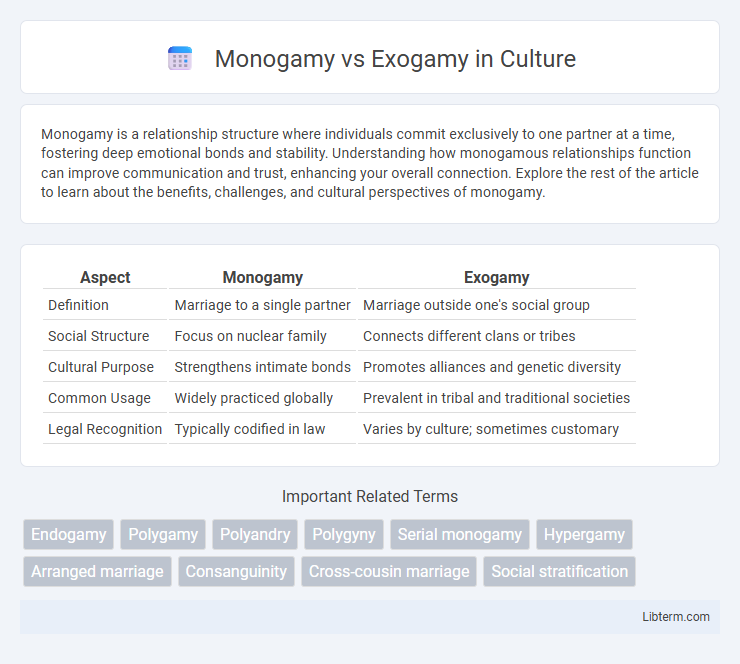Monogamy is a relationship structure where individuals commit exclusively to one partner at a time, fostering deep emotional bonds and stability. Understanding how monogamous relationships function can improve communication and trust, enhancing your overall connection. Explore the rest of the article to learn about the benefits, challenges, and cultural perspectives of monogamy.
Table of Comparison
| Aspect | Monogamy | Exogamy |
|---|---|---|
| Definition | Marriage to a single partner | Marriage outside one's social group |
| Social Structure | Focus on nuclear family | Connects different clans or tribes |
| Cultural Purpose | Strengthens intimate bonds | Promotes alliances and genetic diversity |
| Common Usage | Widely practiced globally | Prevalent in tribal and traditional societies |
| Legal Recognition | Typically codified in law | Varies by culture; sometimes customary |
Understanding Monogamy and Exogamy
Monogamy refers to the practice of having a single spouse or partner at a time, emphasizing exclusive pair bonding and often linked to social stability and inheritance clarity. Exogamy involves marrying or forming relationships outside a specific social group, clan, or community, promoting genetic diversity and social alliances. Understanding these concepts highlights how monogamy fosters intimate, exclusive relationships, while exogamy expands social networks and cultural integration.
Historical Roots of Monogamy
The historical roots of monogamy trace back to ancient civilizations where social stability and inheritance clarity became priorities, especially in early agrarian societies. Archaeological evidence from Mesopotamia and ancient Greece highlights how monogamous pairings regulated property rights and lineage, contrasting with the more fluid kinship systems found in exogamous cultures. Monogamy's establishment was often tied to evolving legal frameworks and religious doctrines that promoted exclusive partnerships for societal order.
Origins and Evolution of Exogamy
Exogamy, originating from prehistoric social structures, evolved as a cultural practice encouraging marriage outside one's immediate kin group to promote genetic diversity and forge broader alliances. Anthropological evidence indicates that early human societies adopted exogamous patterns to prevent inbreeding and facilitate cooperation between tribes. This evolutionary mechanism contributed to social cohesion and the spread of culture, contrasting with monogamous systems that primarily emphasize pair bonding within a restricted social circle.
Cultural Perspectives on Marriage Practices
Cultural perspectives on marriage practices significantly influence the preference for monogamy or exogamy, with monogamy being dominant in Western societies that emphasize nuclear family structures and individual choice. Exogamy, common in many indigenous and tribal cultures, promotes alliances through marriage outside one's social group or kinship to strengthen social networks and ensure genetic diversity. These practices reflect underlying social values and norms, where monogamy supports social stability and inheritance clarity, while exogamy enhances communal ties and resource exchange among distinct groups.
Psychological Impacts of Monogamy
Monogamy often fosters emotional security and deep interpersonal trust by promoting exclusive pair bonding, which can reduce anxiety and strengthen attachment between partners. Psychological studies indicate that monogamous relationships may enhance overall mental well-being by providing consistent social support and stability. However, challenges such as loneliness or dissatisfaction may arise when individual needs for novelty and autonomy are unmet within strict monogamous frameworks.
Social Functions of Exogamy
Exogamy serves crucial social functions by fostering alliances between different groups, which enhances cooperation and resource sharing within communities. This practice reduces inbreeding risks and promotes genetic diversity, contributing to healthier population dynamics. By encouraging marriage outside one's social or kin group, exogamy strengthens social cohesion and expands social networks vital for cultural exchange and conflict resolution.
Monogamy vs Exogamy: Comparative Advantages
Monogamy offers advantages such as enhanced parental investment and stable family structures, promoting consistent resource allocation for offspring. Exogamy increases genetic diversity and social alliances by encouraging marriage outside one's social group or kin, reducing the risks associated with inbreeding. Each system supports different evolutionary and social benefits, with monogamy optimizing offspring survival through dedicated care, while exogamy fosters broader social networks and genetic health.
Challenges and Criticisms of Monogamy
Monogamy faces challenges such as high rates of infidelity, emotional dissatisfaction, and societal pressure to conform to an idealized relationship model. Critics argue that monogamy can restrict personal freedom, limit diversity of social and romantic experiences, and contribute to unrealistic expectations of lifelong exclusivity. Psychological studies highlight that rigid adherence to monogamy sometimes leads to resentment, communication breakdowns, and increased divorce rates.
Exogamy in Contemporary Societies
Exogamy in contemporary societies promotes genetic diversity and social alliances by encouraging marriage outside one's immediate social group or kin. This practice supports multicultural integration and helps reduce inbreeding, fostering broader social networks and cultural exchange. Modern legal and social frameworks increasingly accommodate exogamous unions, reflecting changing attitudes towards family structures and identity.
Future Trends in Marriage Norms
Future trends in marriage norms indicate a shift towards greater acceptance of diverse relationship structures, challenging traditional monogamy and exogamy frameworks. Increasing globalization and digital connectivity promote intercultural unions, expanding exogamous marriage patterns beyond ethnic and social boundaries. Advances in social attitudes and technology may lead to flexible models blending monogamous commitments with broader social networks.
Monogamy Infographic

 libterm.com
libterm.com